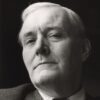People at the top do not want to share their power. They’ve always got some marvellous reason: I’m following my religion; I’m following the laws of economics. Even Stalin: I’m representing the vanguard of the working class, so please don’t cause trouble. That is the battle that every generation has, and yet we mustn’t be pessimistic about it.
Tony Benn (1925-2014) British politician, writer, diarist
“Hope Is the Key,” Interview, Share International (Jan 2003)
(Source)
Quotations by:
Benn, Tony
The key to any progress is to ask the question Why? All the time. Why is that child poor? Why was there a war? Why was he killed? Why is he in power? And of course questions can get you into a lot of trouble, because society is trained by those who run it to accept what goes on. Without questions we won’t make any progress at all.
[The first principle of British democracy is] our prime duty to each other and to what our conscience tells us to be right. If this leads individuals into conflict with the law, those individuals must be ready to take the consequences non-violently. In our democracy no man should tell another man to break the law, nor should any man break the law to by-pass Parliament. But a person who is punished for breaking an unjust law may if he is sincere and his cause wins public sympathy, create a public demand to have that unjust law changed through Parliament. This is the first and most fundamental principle of British democracy. It has a deep moral significance. Our religious and political liberties rest upon it.
The House will forgive me for quoting five democratic questions that I have developed during my life. If one meets a powerful person — Rupert Murdoch, perhaps, or Joe Stalin or Hitler — one can ask five questions: what power do you have; where did you get it; in whose interests do you exercise it; to whom are you accountable; and, how can we get rid of you? Anyone who cannot answer the last of those questions does not live in a democratic system.

